2022年九年级二轮复习专用中考英语冠词、介词课件(共有PPT38张)
文档属性
| 名称 | 2022年九年级二轮复习专用中考英语冠词、介词课件(共有PPT38张) |  | |
| 格式 | pptx | ||
| 文件大小 | 1.5MB | ||
| 资源类型 | 教案 | ||
| 版本资源 | 通用版 | ||
| 科目 | 英语 | ||
| 更新时间 | 2022-04-07 15:27:38 | ||
图片预览


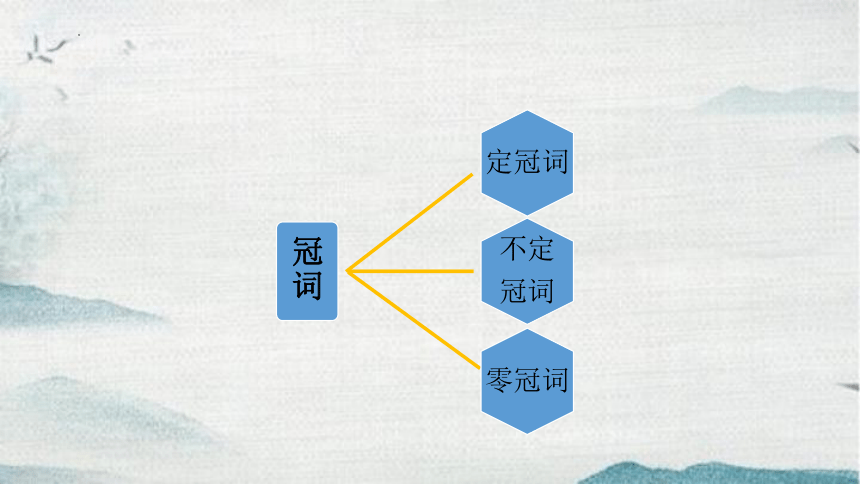
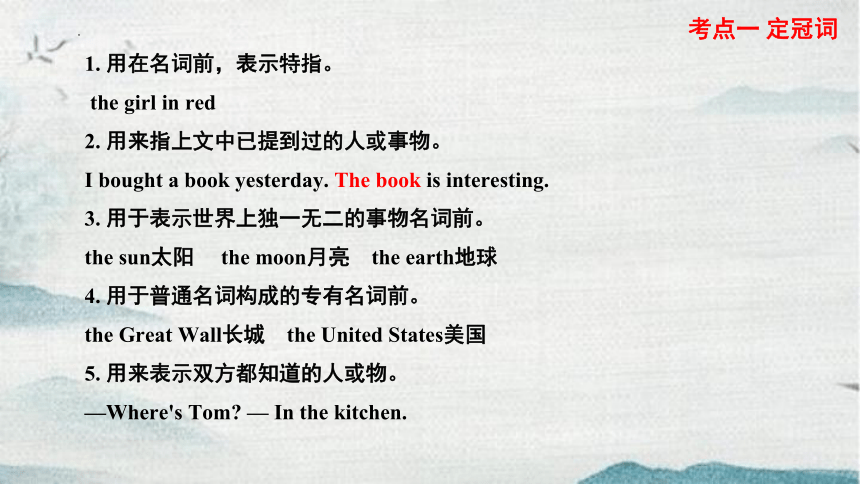
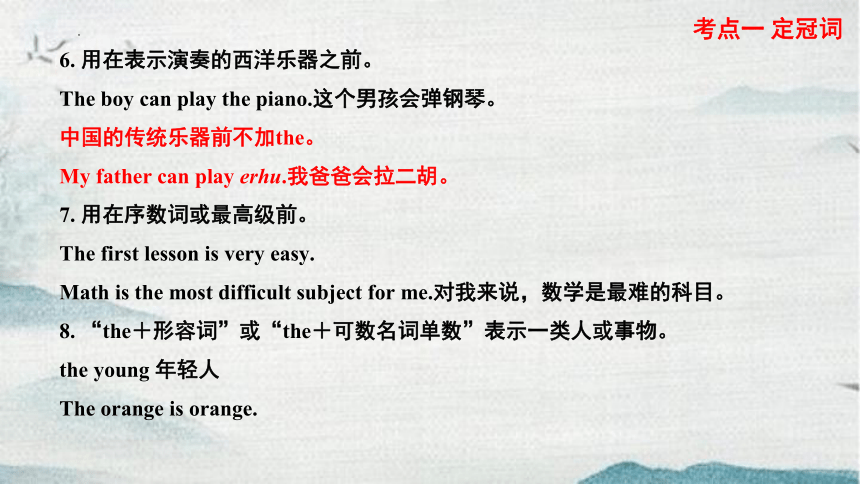
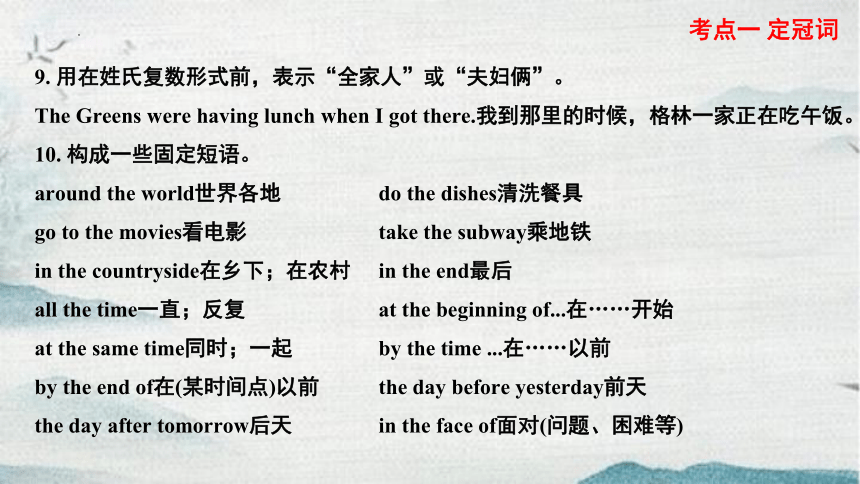
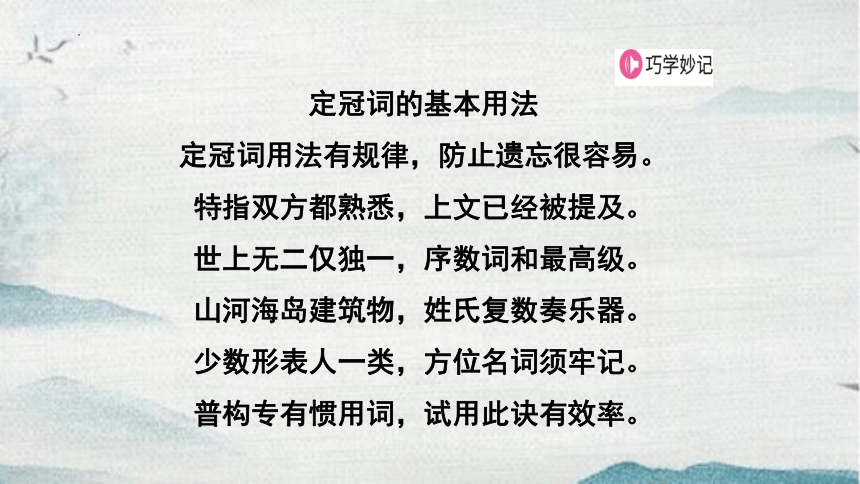
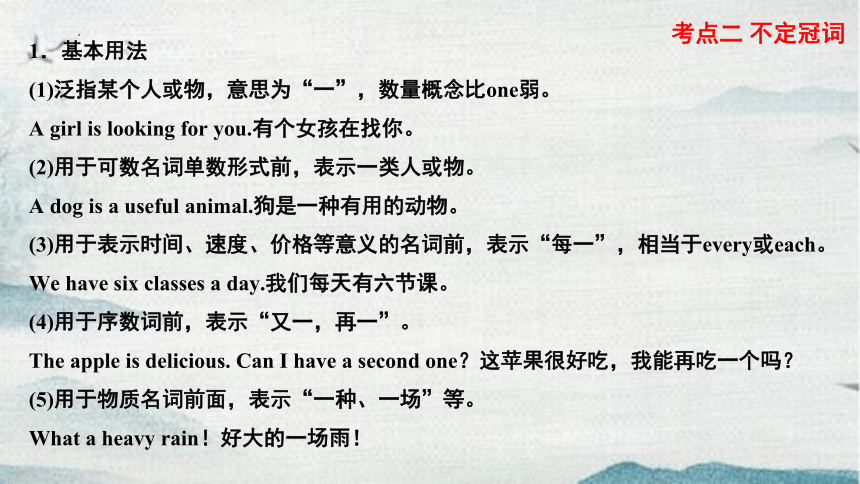
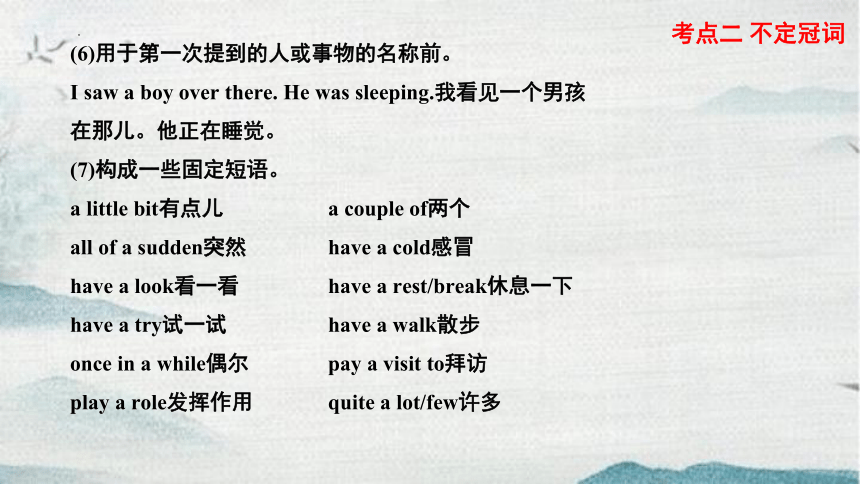

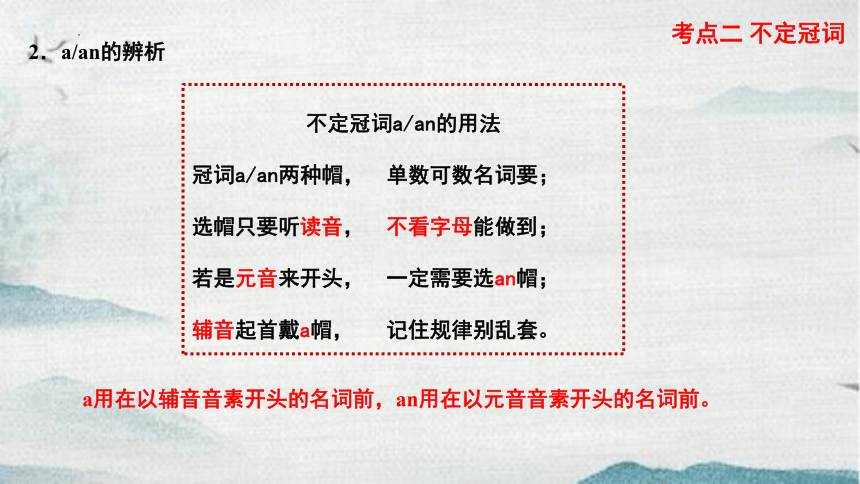
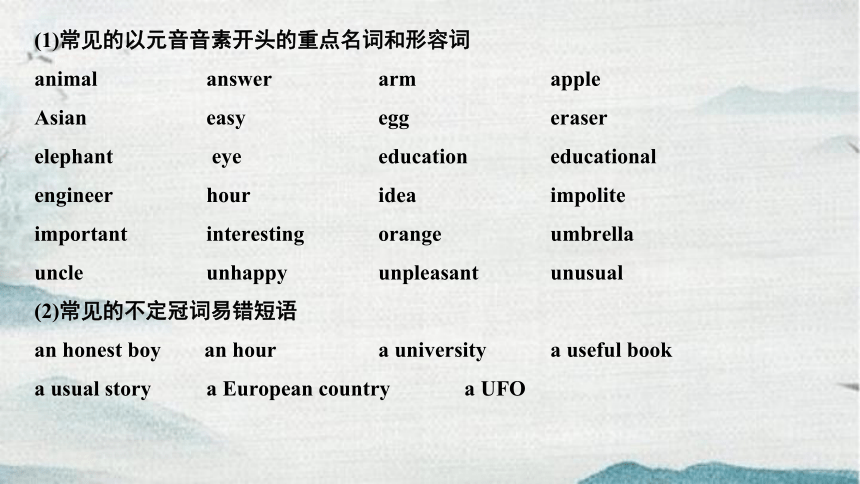
文档简介
(共38张PPT)
语法专题
冠词、介词
语法专题
冠词
冠词
定冠词
不定
冠词
零冠词
1. 用在名词前,表示特指。
the girl in red
2. 用来指上文中已提到过的人或事物。
I bought a book yesterday. The book is interesting.
3. 用于表示世界上独一无二的事物名词前。
the sun太阳 the moon月亮 the earth地球
4. 用于普通名词构成的专有名词前。
the Great Wall长城 the United States美国
5. 用来表示双方都知道的人或物。
—Where's Tom — In the kitchen.
考点一 定冠词
6. 用在表示演奏的西洋乐器之前。
The boy can play the piano.这个男孩会弹钢琴。
中国的传统乐器前不加the。
My father can play erhu.我爸爸会拉二胡。
7. 用在序数词或最高级前。
The first lesson is very easy.
Math is the most difficult subject for me.对我来说,数学是最难的科目。
8. “the+形容词”或“the+可数名词单数”表示一类人或事物。
the young 年轻人
The orange is orange.
考点一 定冠词
9. 用在姓氏复数形式前,表示“全家人”或“夫妇俩”。
The Greens were having lunch when I got there.我到那里的时候,格林一家正在吃午饭。
10. 构成一些固定短语。
around the world世界各地 do the dishes清洗餐具
go to the movies看电影 take the subway乘地铁
in the countryside在乡下;在农村 in the end最后
all the time一直;反复 at the beginning of...在……开始
at the same time同时;一起 by the time ...在……以前
by the end of在(某时间点)以前 the day before yesterday前天
the day after tomorrow后天 in the face of面对(问题、困难等)
考点一 定冠词
定冠词的基本用法
定冠词用法有规律,防止遗忘很容易。
特指双方都熟悉,上文已经被提及。
世上无二仅独一,序数词和最高级。
山河海岛建筑物,姓氏复数奏乐器。
少数形表人一类,方位名词须牢记。
普构专有惯用词,试用此诀有效率。
1.基本用法
(1)泛指某个人或物,意思为“一”,数量概念比one弱。
A girl is looking for you.有个女孩在找你。
(2)用于可数名词单数形式前,表示一类人或物。
A dog is a useful animal.狗是一种有用的动物。
(3)用于表示时间、速度、价格等意义的名词前,表示“每一”,相当于every或each。
We have six classes a day.我们每天有六节课。
(4)用于序数词前,表示“又一,再一”。
The apple is delicious. Can I have a second one?这苹果很好吃,我能再吃一个吗?
(5)用于物质名词前面,表示“一种、一场”等。
What a heavy rain!好大的一场雨!
考点二 不定冠词
(6)用于第一次提到的人或事物的名称前。
I saw a boy over there. He was sleeping.我看见一个男孩在那儿。他正在睡觉。
(7)构成一些固定短语。
a little bit有点儿 a couple of两个
all of a sudden突然 have a cold感冒
have a look看一看 have a rest/break休息一下
have a try试一试 have a walk散步
once in a while偶尔 pay a visit to拜访
play a role发挥作用 quite a lot/few许多
考点二 不定冠词
不定冠词的用法
不定冠词两变体,a或an都表“一”。
可数名词首次提,何人何物不具体。
某类人、物任一个,有时还要表“每一”。
2.a/an的辨析
考点二 不定冠词
不定冠词a/an的用法
冠词a/an两种帽, 单数可数名词要;
选帽只要听读音, 不看字母能做到;
若是元音来开头, 一定需要选an帽;
辅音起首戴a帽, 记住规律别乱套。
a用在以辅音音素开头的名词前,an用在以元音音素开头的名词前。
(1)常见的以元音音素开头的重点名词和形容词
animal answer arm apple
Asian easy egg eraser
elephant eye education educational
engineer hour idea impolite
important interesting orange umbrella
uncle unhappy unpleasant unusual
(2)常见的不定冠词易错短语
an honest boy an hour a university a useful book
a usual story a European country a UFO
1.表示泛指的不可数名词和复数名词前。
Do you like milk/bananas
2.名词前已有指示代词、形容词性物主代词、不定代词或名词所有格等限定词时。
There is no pen in your schoolbag.你书包里没有钢笔。
3.表示节日、季节、月份、日期、星期的名词前。
March 8th is Women's Day.3月8日是妇女节。
表示节日后面用day的时候不用the; 用festival的时候加the,如Thanksgiving Day, the Spring Festival。
考点三 零冠词
4.表示球类、棋类、游戏、学科、语言、三餐的名词前。
What do you like for breakfast?你早餐想吃什么?
Let's play basketball after school.放学后咱们打篮球吧!
5.by后接交通工具时。
by bike骑自行车 by car开汽车
6.某些表示人名、地名、国家名等专有名词前。
China is a great country.
7.构成一些固定短语。
on time准时 on foot步行 at noon在中午
at first首先;最初 by mistake错误地;无意中
考点三 零冠词
零冠词
下列情况不用冠,名词之前代词限。
专有名词不可数,球类、学科与三餐。
复数名词表泛指,节日、月份、星期前。
颜色、语种和国名,称呼、习语及头衔。
有些名词前用冠词或不用冠词,意义有所不同。
(1)at table在吃饭;at the table在桌子旁
(2)in class在上课;in the class在班级中
(3)go to school去上学(是学生);
go to the school到学校去(不一定是学生)
(4)go to bed上床睡觉;go to the bed到床那边去
(5)in front of在……的前面;in the front of在……的前部
(6)in hospital 生病住院;in the hospital 在医院里
语法专题
介词
考点一 时间介词
1.in, on, at
in 用在年、月、季节、世纪和表示泛指的上午、下午、晚上前 in 2011; in January; in summer; in the twentieth century; in the morning/afternoon/evening
“in+时间段”通常用在一般将来时中,表示“(将来)……(时间)以后” I'll move to Beijing in two days.两天后我将去北京。
用在某些表示时间的固定短语中 in the future; in the end; in a minute
on 表示具体某日或某日的上午、下午、晚上 on Monday; on March 12th; on Sunday afternoon; on a cold morning
at 表示具体时间点 at seven o'clock(7:00); at half past five (5:30)
用在固定短语中 at noon; at night; at present; at the beginning (of); at the age of; at Christmas
2.during, in
during和in都表示一段时间。 但during更加强调时间的延续性,可以表示在一段时间内自始至终的状态。
3.for, since
for和since表示的时间状语都有延续之意,“for+时间段”表示“延续多久”,作时间状语时,句子可用过去时、完成时或将来时;since后接表示时间点的短语,意为“自从(过去某时)以来”,说明自过去某时延续至今的一段时间,常与完成时连用。
4.in, after
in和after后都可以接时间段,表示“……(时间)之后”,in用于将来时,after用于过去时。
5.by, before
by表示“截止……;到……为止”,包括其后的时间;before则表示“在某时之前”,不包括其后的时间。
You should get your homework ready by Friday.你应该最迟于星期五把作业准备好。(包含星期五)
Can you come and meet me before Friday?你能在星期五之前来见我吗?(不包含星期五)
考点二 方位介词
1.across, through, past
across强调从表面横过;through强调从内部穿过;past强调从旁边经过。
2.in, on, over, above
in“在……里面”,通常指被包含在某物之内;on“在……上面”,与表面有接触,反义词是beneath;over“在……之上”,指在物体的正上方或覆盖在物体表面,反义词是under;above“在……之上;高于……”,指在上方,不一定是垂直的正上方,其反义词是below。
3.between, among
表示在两者之间用between;在三者或三者以上之间用among。
4.in/on/to+方位名词的用法
in 表示A地在B地范围之内 Taiwan is in the southeast of China.台湾位于中国东南部。
on 表示A地与B地接壤、毗邻 Canada is on the north of America.加拿大位于美国北部。
to 表示A地在B地范围之外,即二者之间有距离间隔 Japan is to the east of China. 日本在中国的东面。
考点三 表示方式、手段或工具的介词
1.交通方式:by, in, on
by+交通工具的单数形式;on/in+限定词+交通工具的单数形式。
I go to school by bike.=I go to school on my bike.
2.表示“用”时,可用“with+工具、手段”“by+交通工具(单数)”“in+语言、嗓音、方式(原料)”。
He told us something interesting in Japanese.他用日语告诉了我们一些有趣的事情。
As a middle school student, don't write with a pencil.作为一名中学生,不要用铅笔写字。
He always goes to school by bus.他总是坐公共汽车去上学。
考点四 其他常考介词
1.on the tree指在树上的东西本身是树的一部分(如叶子、果实)
in the tree指在树上的东西本身不是树的一部分(如鸟、人)
There're some apples on the tree.树上有一些苹果。
There's a bird in the tree.树上有一只鸟。
2.except, but, besides
(1)except表示“除……之外(不再有)”,强调不被包括在内。
The office is open every day except Sundays.办事处除了星期天以外天天开门。
(2)but与except同义,表示“除了”,常用于nothing, nobody, all等代词后。
There's nothing but a desk in the room.房间里只有一张桌子。
(3)besides“除……之外还有”。
What languages do you know besides Chinese and English?
考点五 介词短语
a bit (of)有一点儿
after a while过了一会儿
a little一点儿
all kinds of 各种各样的
a lot of许多
a pair of 一双
a set of 一套;一副;一组
around the world 世界各地
as long as只要;既然
at first起先;首先
at last最后
at least至少;不少于;起码
at night/noon在夜里/中午
at once立刻
at the age of...在……岁时
at the beginning of...在……之初
at the end of...在……之末
at the foot of...在……脚下
at the same time同时
at/on the weekend在周末
because of因为
be different from...与……不同;
be interested in...对……感兴趣
be made of...由……制成的
be similar to...与……相像的
be sure about 确信;对……有把握
between... and...在……和……之间
by bike/air/train/bus/sea
骑自行车/乘飞机/火车/公共汽车/船
by the end of...到……底为止
by the way顺便提一下
by the window在窗边
far away from远离
for example例如
for sure 无疑;肯定
from now on从现在起
from then on从那时起
from...to...从……到……
in a hurry匆忙
in all总共
in (great) danger处于(极大)危险之中
in English 用英语
in fact确切地说;事实上,实际上
in the countryside在乡下;在农村
in the middle of...在……中间
in time及时
in order to为了
in public公众;公开地
in surprise惊奇地
in the end 最后
in turn依次
less than少于
little by little逐渐地
more than 多于
of course当然
one (large) bowl of...一(大)碗……
on foot步行;走路
on one's way to...某人在去……的路上
on the left/right在左(右)边
on the other hand另一方面
on the other side of...在……另一边
on time准时
so far到目前为止;迄今为止
such as例如;像……这样
the same as...和……相同;与……一致
thanks to幸亏
to one's joy/surprise使某人高兴/惊讶的是
with a smile面带笑容
with one's help/with the help of sb.在某人的帮助下;由于某人的帮助
with one's own eyes亲眼所见
易错警示
(1)在this, that, last,next, one, every, some, any, each, all等词之前,介词at, on, in要省略。如:
I saw the man was doing sports under the tree this morning.
今天早上,我看到这个人在树下做运动。
( 2 ) 在today, tonight, tomorrow, yesterday, tomorrow morning等表示时间的名词之前的介词省略。如:
My father is leaving for Shanghai tomorrow morning.
我爸爸明天上午去上海。
⑶ “for + 时间或距离”时,在口语中常被省略,但for短语在句首时,
不能省略。如:
He has been at home (for) all day.
他在家里待了一整天。
For years he has been in America.
他在美国待了多年。
⑷ “of + 大小、形状、年龄、面积、材料”结构中,of常省略掉。特别是
of后面有the same时。如:
He is (of) the same height as his father.
他和他爸爸一样高了。
⑸ 在某些固定短语或习惯用法中省略
spend… (in) doing 在……花费(时间、金钱)
be busy (in) doing 忙于做……
have trouble/difficulty/problems (in) doing… 做……有困难/问题
have fun (in) doing… 做……有乐趣
prevent/stop … (from) doing sth. 阻止……做……
(in) this/ that way 以这种/那种方法
There is no use/ good (in) doing sth. 做……没有好处
Homework
1.(2018·山东济南中考)My classmate Mike is going to Beijing with his father the day after tomorrow.
A.a B.an C.the D./
2.(2017·山东济南中考)—Can I help you
—Yes, please. I need sweater.
A.a B.an C.the D./
3.(2016·山东济南中考)—What's your dream job, Lucy
—I want to be doctor.
A.a B.an C.the D./
4.(2015·山东济南中考)—Excuse me, Helen. What's this in English
—It's tomato.
A.a B.an C.the D./
5.(2014·山东济南中考)—What's that on the table
—It's map.
A.a B.an C.the D./
6.(2013·山东济南中考)—Kate, do you have pen pal
—Yes, I do. I have one in China.
A.a B.an C.the D./
7.(2012·山东济南中考)I want to have English pen pal.
A.a B.the C.an D./
8.(2011·山东济南中考)This is empty bottle. Could you give
me full one
A.a; a B.an; a C.the; the D./; a
1.(2018·山东济南中考)—Do we have a soccer game this week
—Yes. It's Friday, June 15th.
A.on B.in C.at D.to
2.(2018·山东济南中考)—I think self driving cars will come into our life .
—Perhaps.
A.in a few years B.a few years ago
C.for a few years D.after a few years
3.(2017·山东济南中考)—What do you usually eat breakfast
—I usually eat noodles.
A.for B.in C.from D.on
4.(2016·山东济南中考)I often go to the bookstore Quancheng Road
although it's crowded.
A.on B.for C.from D.between
5.(2015·山东济南中考)Tony gets up early in the morning. He likes to make
breakfast his family.
A.at B.on C.for D.from
6.(2014·山东济南中考)—Where's your mother, Gina
—She's sleeping the bedroom.
A.in B.of C.to D.from
7.(2013·山东济南中考)—Mary, does your brother get work by bus
—No, he rides a bike. Sometimes he walks.
A.in B.on C.to D.for
8.(2012·山东济南中考)—Thanks joining the Talk Show!
—You're welcome.
A.by B.on C.of D.for
9.(2011·山东济南中考) Taiwan is part of China. It is the southeast of our country.
A.to B.on C.in D.at
10.(2011·山东济南中考)—Where have you been these days
—I have been to Bei Daihe with a friend .
A.in Chinese B.of Japan
C.of American's D.from Canada
Thanks for your listening!
语法专题
冠词、介词
语法专题
冠词
冠词
定冠词
不定
冠词
零冠词
1. 用在名词前,表示特指。
the girl in red
2. 用来指上文中已提到过的人或事物。
I bought a book yesterday. The book is interesting.
3. 用于表示世界上独一无二的事物名词前。
the sun太阳 the moon月亮 the earth地球
4. 用于普通名词构成的专有名词前。
the Great Wall长城 the United States美国
5. 用来表示双方都知道的人或物。
—Where's Tom — In the kitchen.
考点一 定冠词
6. 用在表示演奏的西洋乐器之前。
The boy can play the piano.这个男孩会弹钢琴。
中国的传统乐器前不加the。
My father can play erhu.我爸爸会拉二胡。
7. 用在序数词或最高级前。
The first lesson is very easy.
Math is the most difficult subject for me.对我来说,数学是最难的科目。
8. “the+形容词”或“the+可数名词单数”表示一类人或事物。
the young 年轻人
The orange is orange.
考点一 定冠词
9. 用在姓氏复数形式前,表示“全家人”或“夫妇俩”。
The Greens were having lunch when I got there.我到那里的时候,格林一家正在吃午饭。
10. 构成一些固定短语。
around the world世界各地 do the dishes清洗餐具
go to the movies看电影 take the subway乘地铁
in the countryside在乡下;在农村 in the end最后
all the time一直;反复 at the beginning of...在……开始
at the same time同时;一起 by the time ...在……以前
by the end of在(某时间点)以前 the day before yesterday前天
the day after tomorrow后天 in the face of面对(问题、困难等)
考点一 定冠词
定冠词的基本用法
定冠词用法有规律,防止遗忘很容易。
特指双方都熟悉,上文已经被提及。
世上无二仅独一,序数词和最高级。
山河海岛建筑物,姓氏复数奏乐器。
少数形表人一类,方位名词须牢记。
普构专有惯用词,试用此诀有效率。
1.基本用法
(1)泛指某个人或物,意思为“一”,数量概念比one弱。
A girl is looking for you.有个女孩在找你。
(2)用于可数名词单数形式前,表示一类人或物。
A dog is a useful animal.狗是一种有用的动物。
(3)用于表示时间、速度、价格等意义的名词前,表示“每一”,相当于every或each。
We have six classes a day.我们每天有六节课。
(4)用于序数词前,表示“又一,再一”。
The apple is delicious. Can I have a second one?这苹果很好吃,我能再吃一个吗?
(5)用于物质名词前面,表示“一种、一场”等。
What a heavy rain!好大的一场雨!
考点二 不定冠词
(6)用于第一次提到的人或事物的名称前。
I saw a boy over there. He was sleeping.我看见一个男孩在那儿。他正在睡觉。
(7)构成一些固定短语。
a little bit有点儿 a couple of两个
all of a sudden突然 have a cold感冒
have a look看一看 have a rest/break休息一下
have a try试一试 have a walk散步
once in a while偶尔 pay a visit to拜访
play a role发挥作用 quite a lot/few许多
考点二 不定冠词
不定冠词的用法
不定冠词两变体,a或an都表“一”。
可数名词首次提,何人何物不具体。
某类人、物任一个,有时还要表“每一”。
2.a/an的辨析
考点二 不定冠词
不定冠词a/an的用法
冠词a/an两种帽, 单数可数名词要;
选帽只要听读音, 不看字母能做到;
若是元音来开头, 一定需要选an帽;
辅音起首戴a帽, 记住规律别乱套。
a用在以辅音音素开头的名词前,an用在以元音音素开头的名词前。
(1)常见的以元音音素开头的重点名词和形容词
animal answer arm apple
Asian easy egg eraser
elephant eye education educational
engineer hour idea impolite
important interesting orange umbrella
uncle unhappy unpleasant unusual
(2)常见的不定冠词易错短语
an honest boy an hour a university a useful book
a usual story a European country a UFO
1.表示泛指的不可数名词和复数名词前。
Do you like milk/bananas
2.名词前已有指示代词、形容词性物主代词、不定代词或名词所有格等限定词时。
There is no pen in your schoolbag.你书包里没有钢笔。
3.表示节日、季节、月份、日期、星期的名词前。
March 8th is Women's Day.3月8日是妇女节。
表示节日后面用day的时候不用the; 用festival的时候加the,如Thanksgiving Day, the Spring Festival。
考点三 零冠词
4.表示球类、棋类、游戏、学科、语言、三餐的名词前。
What do you like for breakfast?你早餐想吃什么?
Let's play basketball after school.放学后咱们打篮球吧!
5.by后接交通工具时。
by bike骑自行车 by car开汽车
6.某些表示人名、地名、国家名等专有名词前。
China is a great country.
7.构成一些固定短语。
on time准时 on foot步行 at noon在中午
at first首先;最初 by mistake错误地;无意中
考点三 零冠词
零冠词
下列情况不用冠,名词之前代词限。
专有名词不可数,球类、学科与三餐。
复数名词表泛指,节日、月份、星期前。
颜色、语种和国名,称呼、习语及头衔。
有些名词前用冠词或不用冠词,意义有所不同。
(1)at table在吃饭;at the table在桌子旁
(2)in class在上课;in the class在班级中
(3)go to school去上学(是学生);
go to the school到学校去(不一定是学生)
(4)go to bed上床睡觉;go to the bed到床那边去
(5)in front of在……的前面;in the front of在……的前部
(6)in hospital 生病住院;in the hospital 在医院里
语法专题
介词
考点一 时间介词
1.in, on, at
in 用在年、月、季节、世纪和表示泛指的上午、下午、晚上前 in 2011; in January; in summer; in the twentieth century; in the morning/afternoon/evening
“in+时间段”通常用在一般将来时中,表示“(将来)……(时间)以后” I'll move to Beijing in two days.两天后我将去北京。
用在某些表示时间的固定短语中 in the future; in the end; in a minute
on 表示具体某日或某日的上午、下午、晚上 on Monday; on March 12th; on Sunday afternoon; on a cold morning
at 表示具体时间点 at seven o'clock(7:00); at half past five (5:30)
用在固定短语中 at noon; at night; at present; at the beginning (of); at the age of; at Christmas
2.during, in
during和in都表示一段时间。 但during更加强调时间的延续性,可以表示在一段时间内自始至终的状态。
3.for, since
for和since表示的时间状语都有延续之意,“for+时间段”表示“延续多久”,作时间状语时,句子可用过去时、完成时或将来时;since后接表示时间点的短语,意为“自从(过去某时)以来”,说明自过去某时延续至今的一段时间,常与完成时连用。
4.in, after
in和after后都可以接时间段,表示“……(时间)之后”,in用于将来时,after用于过去时。
5.by, before
by表示“截止……;到……为止”,包括其后的时间;before则表示“在某时之前”,不包括其后的时间。
You should get your homework ready by Friday.你应该最迟于星期五把作业准备好。(包含星期五)
Can you come and meet me before Friday?你能在星期五之前来见我吗?(不包含星期五)
考点二 方位介词
1.across, through, past
across强调从表面横过;through强调从内部穿过;past强调从旁边经过。
2.in, on, over, above
in“在……里面”,通常指被包含在某物之内;on“在……上面”,与表面有接触,反义词是beneath;over“在……之上”,指在物体的正上方或覆盖在物体表面,反义词是under;above“在……之上;高于……”,指在上方,不一定是垂直的正上方,其反义词是below。
3.between, among
表示在两者之间用between;在三者或三者以上之间用among。
4.in/on/to+方位名词的用法
in 表示A地在B地范围之内 Taiwan is in the southeast of China.台湾位于中国东南部。
on 表示A地与B地接壤、毗邻 Canada is on the north of America.加拿大位于美国北部。
to 表示A地在B地范围之外,即二者之间有距离间隔 Japan is to the east of China. 日本在中国的东面。
考点三 表示方式、手段或工具的介词
1.交通方式:by, in, on
by+交通工具的单数形式;on/in+限定词+交通工具的单数形式。
I go to school by bike.=I go to school on my bike.
2.表示“用”时,可用“with+工具、手段”“by+交通工具(单数)”“in+语言、嗓音、方式(原料)”。
He told us something interesting in Japanese.他用日语告诉了我们一些有趣的事情。
As a middle school student, don't write with a pencil.作为一名中学生,不要用铅笔写字。
He always goes to school by bus.他总是坐公共汽车去上学。
考点四 其他常考介词
1.on the tree指在树上的东西本身是树的一部分(如叶子、果实)
in the tree指在树上的东西本身不是树的一部分(如鸟、人)
There're some apples on the tree.树上有一些苹果。
There's a bird in the tree.树上有一只鸟。
2.except, but, besides
(1)except表示“除……之外(不再有)”,强调不被包括在内。
The office is open every day except Sundays.办事处除了星期天以外天天开门。
(2)but与except同义,表示“除了”,常用于nothing, nobody, all等代词后。
There's nothing but a desk in the room.房间里只有一张桌子。
(3)besides“除……之外还有”。
What languages do you know besides Chinese and English?
考点五 介词短语
a bit (of)有一点儿
after a while过了一会儿
a little一点儿
all kinds of 各种各样的
a lot of许多
a pair of 一双
a set of 一套;一副;一组
around the world 世界各地
as long as只要;既然
at first起先;首先
at last最后
at least至少;不少于;起码
at night/noon在夜里/中午
at once立刻
at the age of...在……岁时
at the beginning of...在……之初
at the end of...在……之末
at the foot of...在……脚下
at the same time同时
at/on the weekend在周末
because of因为
be different from...与……不同;
be interested in...对……感兴趣
be made of...由……制成的
be similar to...与……相像的
be sure about 确信;对……有把握
between... and...在……和……之间
by bike/air/train/bus/sea
骑自行车/乘飞机/火车/公共汽车/船
by the end of...到……底为止
by the way顺便提一下
by the window在窗边
far away from远离
for example例如
for sure 无疑;肯定
from now on从现在起
from then on从那时起
from...to...从……到……
in a hurry匆忙
in all总共
in (great) danger处于(极大)危险之中
in English 用英语
in fact确切地说;事实上,实际上
in the countryside在乡下;在农村
in the middle of...在……中间
in time及时
in order to为了
in public公众;公开地
in surprise惊奇地
in the end 最后
in turn依次
less than少于
little by little逐渐地
more than 多于
of course当然
one (large) bowl of...一(大)碗……
on foot步行;走路
on one's way to...某人在去……的路上
on the left/right在左(右)边
on the other hand另一方面
on the other side of...在……另一边
on time准时
so far到目前为止;迄今为止
such as例如;像……这样
the same as...和……相同;与……一致
thanks to幸亏
to one's joy/surprise使某人高兴/惊讶的是
with a smile面带笑容
with one's help/with the help of sb.在某人的帮助下;由于某人的帮助
with one's own eyes亲眼所见
易错警示
(1)在this, that, last,next, one, every, some, any, each, all等词之前,介词at, on, in要省略。如:
I saw the man was doing sports under the tree this morning.
今天早上,我看到这个人在树下做运动。
( 2 ) 在today, tonight, tomorrow, yesterday, tomorrow morning等表示时间的名词之前的介词省略。如:
My father is leaving for Shanghai tomorrow morning.
我爸爸明天上午去上海。
⑶ “for + 时间或距离”时,在口语中常被省略,但for短语在句首时,
不能省略。如:
He has been at home (for) all day.
他在家里待了一整天。
For years he has been in America.
他在美国待了多年。
⑷ “of + 大小、形状、年龄、面积、材料”结构中,of常省略掉。特别是
of后面有the same时。如:
He is (of) the same height as his father.
他和他爸爸一样高了。
⑸ 在某些固定短语或习惯用法中省略
spend… (in) doing 在……花费(时间、金钱)
be busy (in) doing 忙于做……
have trouble/difficulty/problems (in) doing… 做……有困难/问题
have fun (in) doing… 做……有乐趣
prevent/stop … (from) doing sth. 阻止……做……
(in) this/ that way 以这种/那种方法
There is no use/ good (in) doing sth. 做……没有好处
Homework
1.(2018·山东济南中考)My classmate Mike is going to Beijing with his father the day after tomorrow.
A.a B.an C.the D./
2.(2017·山东济南中考)—Can I help you
—Yes, please. I need sweater.
A.a B.an C.the D./
3.(2016·山东济南中考)—What's your dream job, Lucy
—I want to be doctor.
A.a B.an C.the D./
4.(2015·山东济南中考)—Excuse me, Helen. What's this in English
—It's tomato.
A.a B.an C.the D./
5.(2014·山东济南中考)—What's that on the table
—It's map.
A.a B.an C.the D./
6.(2013·山东济南中考)—Kate, do you have pen pal
—Yes, I do. I have one in China.
A.a B.an C.the D./
7.(2012·山东济南中考)I want to have English pen pal.
A.a B.the C.an D./
8.(2011·山东济南中考)This is empty bottle. Could you give
me full one
A.a; a B.an; a C.the; the D./; a
1.(2018·山东济南中考)—Do we have a soccer game this week
—Yes. It's Friday, June 15th.
A.on B.in C.at D.to
2.(2018·山东济南中考)—I think self driving cars will come into our life .
—Perhaps.
A.in a few years B.a few years ago
C.for a few years D.after a few years
3.(2017·山东济南中考)—What do you usually eat breakfast
—I usually eat noodles.
A.for B.in C.from D.on
4.(2016·山东济南中考)I often go to the bookstore Quancheng Road
although it's crowded.
A.on B.for C.from D.between
5.(2015·山东济南中考)Tony gets up early in the morning. He likes to make
breakfast his family.
A.at B.on C.for D.from
6.(2014·山东济南中考)—Where's your mother, Gina
—She's sleeping the bedroom.
A.in B.of C.to D.from
7.(2013·山东济南中考)—Mary, does your brother get work by bus
—No, he rides a bike. Sometimes he walks.
A.in B.on C.to D.for
8.(2012·山东济南中考)—Thanks joining the Talk Show!
—You're welcome.
A.by B.on C.of D.for
9.(2011·山东济南中考) Taiwan is part of China. It is the southeast of our country.
A.to B.on C.in D.at
10.(2011·山东济南中考)—Where have you been these days
—I have been to Bei Daihe with a friend .
A.in Chinese B.of Japan
C.of American's D.from Canada
Thanks for your listening!
同课章节目录
- 词法
- 名词
- 动词和动词短语
- 动词语态
- 动词时态
- 助动词和情态动词
- 非谓语动词
- 冠词
- 代词
- 数词和量词
- 形容词副词及其比较等级
- 介词和介词短语
- 连词和感叹词
- 构词法
- 相似、相近词比较
- 句法
- 陈述句
- 一般疑问句和否定疑问句
- 特殊疑问句及选择疑问句
- 反意疑问句
- 存在句(There be句型)
- 宾语从句
- 定语从句
- 状语从句
- 主谓一致问题
- 简单句
- 并列句
- 复合句
- 主谓一致
- 主、表语从句
- 名词性从句
- 直接引语和间接引语
- 虚拟语气
- 感叹句
- 强调句
- 倒装句
- 祈使句
- 句子的成分
- 句子的分类
- 题型专区
- 单项选择部分
- 易错题
- 完形填空
- 阅读理解
- 词汇练习
- 听说训练
- 句型转换
- 补全对话
- 短文改错
- 翻译
- 书面表达
- 任务型阅读
- 语法填空
- 其他资料
